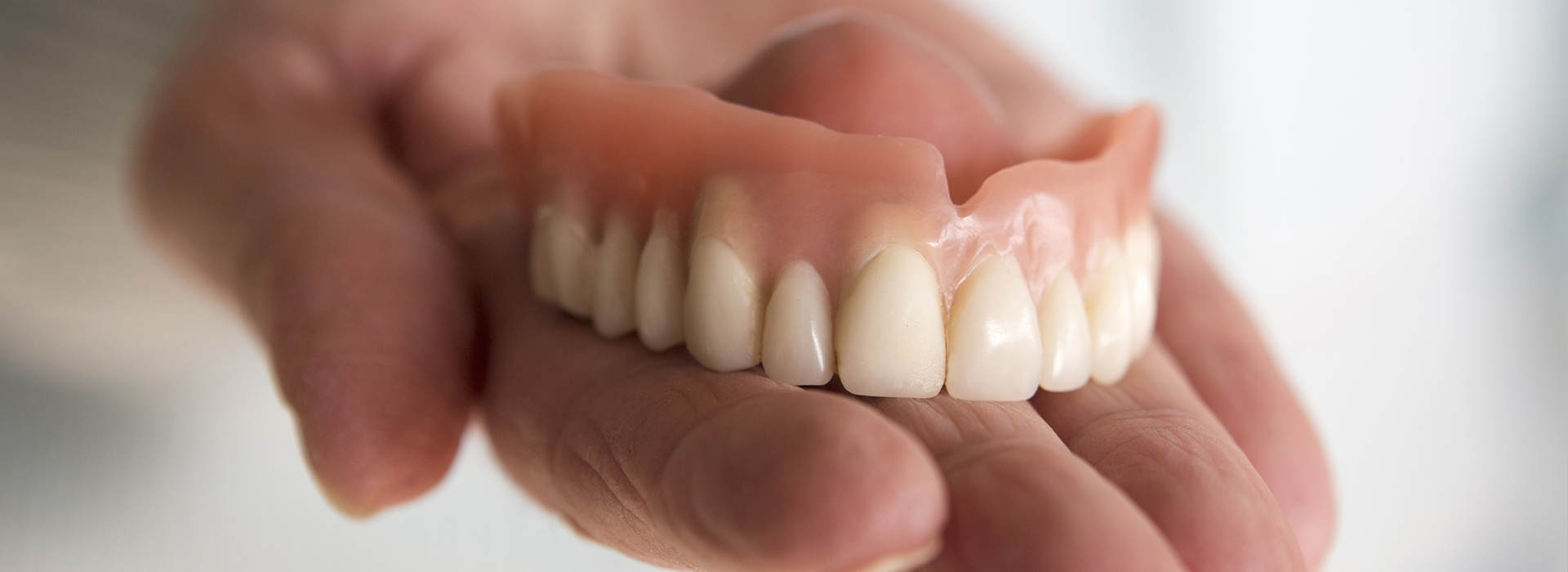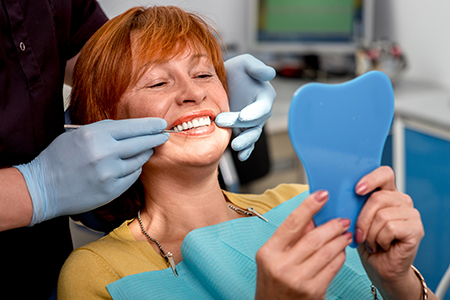Call Us Today!
(248) 863-9109
New Patients
(248) 221-2314

Thanks to advances in dental materials, technology, and methods of care, it’s easier than ever before to replace missing teeth with the most natural-looking and aesthetically pleasing treatment outcomes. While dental implants and fixed bridgework provide effective and satisfying solutions for missing teeth, removable dentures remain a tried and true method for reestablishing a complete smile.
At the office of Royal Dental Center, we fabricate dentures from the highest grade of dental materials for a precise and comfortable fit. Our dentures are meticulously designed to rebuild beautiful smiles and support natural facial contours while enabling patients to speak, smile, and chew with renewed confidence and ease.
We’re dedicated to helping patients to enjoy the benefits of a beautiful smile and take pride in offering personalized solutions to address their dental needs, lifestyle, and budget.
According to recent statistics, it’s estimated that across the country, over 175 million adults have lost at least one tooth, and close to 40 million are missing all of their teeth. In most of these cases, tooth loss is the end result of extensive dental decay, advanced gum disease, a traumatic injury, a congenital anomaly, or associated with a medical condition.
In addition to the psychological and social consequences having embarrassing gaps in your smile often produce, missing teeth can affect your ability to speak clearly and eat a satisfying and nutritious diet. Left unaddressed, missing teeth can also cause gradual changes to your appearance and the alignment of your remaining teeth. These changes not only affect your bite, but they have the potential to create more unsightly and unhealthy gaps in your smile. Furthermore, without the support of a complete set of teeth, facial contours may also begin to look more sagged and haggard over time.
While it’s never too late to rebuild a complete and beautiful smile, it’s always best to replace missing teeth sooner than later. Both partial and full dentures from the office of Royal Dental Center offer an effective and satisfying solution for reestablishing a complete smile.

Dentures are removable appliances that are designed to precisely and comfortably rest on top of the gums that cover the jawbones. They consist of natural-looking artificial teeth set in a supportive base. In addition to offering a cost-effective solution for the replacement of missing teeth, dentures are quite versatile. They can be used to replace either a few teeth that have been lost or all of the teeth in the upper or lower jaws.
While conventional bridgework and dental implants offer fixed solutions for rebuilding complete smiles, partial and full dentures are removable oral appliances. This statement means it’s possible to take dentures out of the mouth to clean and maintain the health of the underlying tissues and any remaining teeth, as well as clean the dentures themselves, or remove them while sleeping.
You can rest assured that rebuilding your smile is in the best of hands at the office of Royal Dental Center. As skilled and experienced providers of care, we’ll carefully evaluate all aspects of your smile, the health and integrity of any remaining teeth, along with the surrounding tissues and the supporting bone to develop a treatment plan that satisfies the functional and aesthetic requirements of your case.
The two main types of removable dentures are full dentures and partial dentures. Which of these types offers the best solution for your smile depends on how many natural teeth are still present in your mouth and the health of these remaining teeth. While a partial denture can offer an effective solution in cases where some sturdy natural teeth remain, you may be a candidate for a complete denture when all the upper or lower teeth are missing or require extraction.
Full dentures, also known as complete dentures, can effectively replace all the upper teeth, lower teeth, or both the upper and lower teeth. As with other types of dental solutions, there’s no one-size-fits-all approach for every case. The ultimate design, fabrication, and insertion of a full denture can vary based upon a patient’s specific needs.
This type of denture is fabricated and placed after all of the remaining teeth are removed, and the surrounding tissues have adequately healed. Fabricating a full denture when healing is complete supports a precise and comfortable fit.
Immediate Denture
With an immediate denture, a patient does not have to go without teeth while waiting for complete healing of the extraction sites. Although an immediate denture offers the advantage of not having to go without teeth for any length of time, it can require a reline and adjustments as the tissues remodel and heal. In some cases, for optimal comfort and fit, a conventional denture may eventually be required.
Overdenture
An overdenture is a type of complete denture that receives added stability and support from special attachments that are secured to the remaining underlying teeth or specialized dental implants.
Implant-Supported Dentures
As the name implies, this type of denture attaches to a select number of strategically placed implants in the upper or lower jaw. These small surgical posts provide precise points of attachment for the overlying denture and add a significant measure of stability and retention.
In situations where some sturdy teeth remain, partial dentures can offer an effective solution for the replacement of missing teeth. Partial dentures typically achieve adequate retention and stability with clasps or precision attachments on the teeth adjacent to the edentulous areas (the spaces formerly occupied by the missing teeth).
Removable partial dentures can fill the void left by individual missing teeth and multiple ones to restore the look and function of a complete smile. At the same time a partial denture fills the gaps left by missing teeth; it also stabilizes the dentition and bite and prevents unwanted drifting of the remaining natural teeth.
As with full dentures, partial denture design and fabrication varies based on a patient’s specific needs. With advances in dental materials and technology, partial denture wearers have more options than ever before. Today, a partial denture’s supportive framework can be fabricated from various materials, including cast metal, flexible resins, and hybrid materials.
At the office of Royal Dental Center, we’re dedicated to building healthy and beautiful smiles. As your trusted partner in care, you can depend on our office to design and fabricate a denture that will look good, fit comfortably, and serve you well for years to come.

Fabricating an attractive, well-fitting, and long-lasting denture requires a comprehensive understanding of oral function, facial aesthetics, dental materials, and appliance design. At the office of Royal Dental Center, we maintain a position at the forefront of advances in care and successfully combine the art and science of dentistry to provide patients with outstanding treatment outcomes.
Once we’ve had an opportunity to review your medical and dental history, assess all aspects of your smile, and discuss your expectation of care, we’ll discuss the best options for restoring and rebuilding your smile.
Based upon a comprehensive analysis of your case, including advanced diagnostic imaging, we’ll advise you if any dental work, additional procedures, or extractions are required prior to the fabrication of a partial or complete denture. It’s essential that any remaining teeth are healthy and have sufficient bone support. Sometimes, a pre-prosthetic procedure to improve the tissue anatomy and ensure a denture’s optimal fit is recommended.
Having a denture or set of dentures made is a sophisticated process involving dental impressions, framework try-ins, selecting the right shade, shape, and size of the artificial teeth, and making sure that the bite and all aspects of oral function are comfortable and healthy. Whether it takes a single visit or a few visits to fabricate a partial or complete denture, a satisfying and healthy outcome relies on the careful execution of every step in care.

At the office of Royal Dental Center, our patients' care and comfort are our top priorities. Our goal is to help patients enjoy optimal oral health and to keep them well informed every step of the way.
Adjusting to wearing a new denture
Getting used to wearing a new denture, especially a full denture, can take a little time. It’s not unusual to need some minor adjustments as you begin to speak, chew, and function with your new teeth. It can take a few adjustments to fit completely and feel comfortable. If you have a sore spot, try to wear the denture at least the day before your adjustment visit. In this way, we can see exactly where we need to relieve the area causing your irritation.
More saliva than usual
One of the natural responses to a new denture is for your mouth to produce more saliva. Not to worry, this is only a temporary reaction. The flow of saliva gradually decreases back to a normal level.
Speaking with ease
While it may seem challenging to speak clearly at first with a new denture, that feeling will pass within a few days. It’s important to keep talking, as usual, to allow yourself to adapt to your new set of teeth. You can help things along by reading some passages from printed materials or a computer out loud.
Getting used to eating with a denture
If this is your first denture, it can also take some time to adapt to eating with your new prosthesis. Getting used to eating with a full denture is typically more challenging than doing so with a partial denture. It’s best to start with soft foods and to avoid chewing on just one side. Your tongue, lips, cheeks, and soft tissues will soon adapt to chewing with your new denture, and from then on, you’ll be able to eat with ease.
Taking care of your dentures
It’s essential to keep your denture clean! Rinse your dentures after eating and brush them daily. In this way, you can prevent stains and bacteria from accumulating on your new set of teeth. It helps to use a brush designed for dentures. Also, remember to soak your dentures in water when you’re not wearing them and at least once a week in the recommended denture cleaner.
Brush any remaining teeth as well as your gums to keep them clean and the tissues healthy and firm. If you wear an upper denture, rinse and gently clean the roof of your mouth as well.
Take your dentures out at bedtime. This practice gives the gums and the jawbone a chance to rest, helping to prevent irritation and infection as well as bone resorption (shrinkage).
Added stability
Due to the status of the underlying tissues and other factors, there are some cases where full dentures benefit from additional means of retention. While denture adhesive is often sufficient, full dentures that are implant-supported or clip onto special attachments offer added stability and retention.
Follow-up care
Maintaining oral health and overall well-being involves routine checkups and care. At these visits, we not only check the fit and condition of your dentures but we also perform a comprehensive exam to check the status of any remaining teeth as well as assess the health of all of the soft and hard tissues in and around the oral cavity.
Relines
Over time, the tissues supporting the denture can change. As the shape and contours of these tissues shrink or remodel, your denture may not fit as comfortably or feel as stable as it once did. A separate procedure, which is known as a reline, may be recommended.
At the office of Royal Dental Center, we’re dedicated to providing the highest quality of care. If you have any additional questions or concerns about your new dentures, feel free to contact our office.
Today, it’s easier than ever to replace missing teeth and achieve natural-looking, durable, and long-lasting results! Depending on a patient’s dental needs, lifestyle, expectations of care, and budget, choices can include conventional fixed bridgework, dental implants, or removable partial and complete dentures. At the office of Royal Dental Center, we’ll discuss all your options in care and answer all your questions as you choose the solution that’s right for you.
With advances in dental materials and technology, today’s dentures are more comfortable and realistic-looking than ever before.
Whether you wear partial or complete dentures, it’s essential to see the dentist for routine care. Besides checking the fit and condition of your dentures and making any necessary adjustments, you’ll also receive a comprehensive exam to check on the health of any remaining teeth as well as the soft and hard tissues in and around the oral cavity.
A same-day denture offers an accelerated design and fabrication process that allows a patient to go from impression taking to denture insertion in a single day.
For patients who don’t want to wait after having teeth extracted, an immediate denture can be inserted the same day your teeth are removed. Sometime later you may need the denture relined to address any changes in its fit once the extraction sites have completely healed.
While no one wants to drop or break a partial or complete denture, accidents do happen. The good news is that in some cases, your partial or complete denture is reparable. It all depends on the extent of the damage. Don’t hesitate to contact our office if you’ve broken or damaged your denture. We’re happy to help.
The simple act of taking your partial denture in and out can cause certain types of metal clasps to loosen over time. When you come in for your checkup visit or contact our office for an adjustment, we’ll assess the fit of your partial and tighten the clasps for improved stability and comfort.
While rebuilding a complete smile is a worthwhile investment, our office is sensitive to the costs involved in dental care. We customize care and will discuss which treatment options address your needs, lifestyle, and budget. How much a new denture will cost depends on the type of the prosthesis, its design, and the materials used to fabricate the supportive base, teeth, and clasps or precision attachments. Dentures that include the placement of dental implants for added retention and stability typically involve additional costs.
If you have dental insurance, your coverage may include a new or replacement set of dentures. Our staff is happy to review your coverage with you to ensure you are maximizing your insurance benefits while minimizing any out of pocket expenses.
At the office of Royal Dental Center, we provide an extensive range of dental services, including the latest and most effective methods to help patients with missing teeth rebuild complete and beautiful smiles. As skilled and experienced professionals, we recognize that every patient is different, and every smile is unique. We’re passionate about what we do and take great pride in providing personalized treatment plans while treating our patients as valued partners in care.
Dentures are removable dental appliances that replace missing teeth and the surrounding tissues. They consist of artificial teeth set in a supportive base that rests on the gums and underlying bone. Dentures restore the appearance of a full smile and help reestablish chewing and speaking function.
Full dentures replace all teeth in an arch while partial dentures fill gaps when some natural teeth remain. Dentures rely on a precise fit, the contours of the gums, and sometimes adhesives or attachments to remain stable. With proper design and care, dentures can provide comfortable and reliable function for daily activities.
Candidates for dentures include people who have lost multiple teeth or all teeth due to decay, gum disease, trauma, or congenital conditions. The choice between a partial or full denture depends on how many healthy natural teeth remain and their location. Your overall medical history and oral health are also important factors in determining candidacy.
A careful clinical evaluation, including examination of the gums, remaining teeth and supporting bone, is required before recommending dentures. In some cases, pre-prosthetic procedures or extractions may be necessary to prepare the mouth for an optimal denture fit. Your dental team will review functional needs and aesthetic goals to select the appropriate appliance.
The denture process begins with a comprehensive exam, detailed impressions and records of your bite and jaw relationships. Laboratory steps include fabricating a framework or base, selecting tooth shapes and shades, and arranging teeth for trials and adjustments. Multiple clinical appointments are often needed to confirm fit, function and appearance before the final denture is delivered.
At Royal Dental Center we coordinate each step to achieve a precise, comfortable fit and a natural appearance. Trial fittings allow the dentist to evaluate speech, bite and esthetics and to make refinements before completion. After insertion, follow-up visits ensure comfort and any necessary adjustments are made.
A conventional denture is made after the gums have healed from extractions and is designed to fit the healed tissues. An immediate denture is placed the same day teeth are removed so the patient does not go without teeth during healing; it typically requires adjustments or relining as tissues remodel. The two approaches differ mainly in timing and the need for subsequent modifications as tissues change.
Implant-supported dentures attach to dental implants or special attachments anchored in the jaw to provide added retention and stability. Such prostheses can clip onto implants or be screwed into place, reducing movement and improving function. The choice among these options depends on bone support, health considerations and the patient’s functional needs.
Daily cleaning of dentures helps prevent stains, odors and bacterial buildup. Rinse dentures after eating to remove loose food particles and brush them gently with a soft denture brush and a nonabrasive cleanser to avoid scratching the surface. Avoid using regular toothpaste, which can be abrasive and damage denture surfaces.
Soak dentures overnight in plain water or a recommended denture solution to keep them hydrated and to allow the supporting tissues to rest. Care for any remaining natural teeth, gums and tongue by brushing and cleaning thoroughly each day. Regular checkups allow your dentist to inspect the dentures and the health of the underlying tissues.
An adjustment period is normal as your mouth adapts to the presence of a new denture, and you may experience mild soreness, increased saliva production or temporary speech changes. It can take several days to weeks to become comfortable, and a few follow-up visits are commonly needed to refine the fit. If a sore spot develops, wearing the denture briefly before the adjustment visit can help the dentist locate and relieve the pressure area.
Patience and gradual practice with speaking and eating will speed adaptation and build confidence. Continue to report persistent pain, significant looseness or difficulty eating so adjustments can be made promptly. Routine follow-up care also helps monitor tissue health and identify when relines or repairs are necessary.
New dentures can temporarily affect pronunciation and chewing patterns because your tongue and lips must learn to coordinate with the prosthesis. Speaking slowly and practicing common words or reading aloud can accelerate speech adaptation. For eating, begin with soft foods cut into small pieces and chew on both sides to distribute pressure evenly.
As you gain experience, gradually reintroduce firmer foods and vary textures to rebuild chewing strength and coordination. If you have difficulties that do not improve with practice, consult your dentist to evaluate fit, occlusion and tooth position. Properly adjusted dentures will significantly reduce speech and eating challenges.
The lifespan of dentures varies based on materials, oral changes and how well they are maintained, but most dentures function well for several years. Over time the jawbone and soft tissues change shape, which can alter how a denture fits and feels. When fit becomes loose, function is compromised, or the appliance shows wear, a reline, repair or replacement may be recommended.
A reline restores intimate contact between the denture base and the gums by adding new material to the tissue side of the denture. Regular dental visits allow the team to monitor changes and advise on the appropriate intervention to preserve comfort and oral health. Addressing fit issues promptly helps prevent sore spots, decreased function and tissue irritation.
Yes, dentures can be used in combination with dental implants to improve retention, stability and chewing efficiency. Implant-supported or implant-retained dentures attach to a small number of implants with snaps, bars or screw-retained connections to reduce movement and increase patient confidence. This hybrid approach often provides a more secure feel than conventional removable dentures.
Not every patient is a candidate for implant-supported options; evaluation of bone quantity, overall health and treatment goals is necessary. When appropriate, the implant-supported solution can enhance comfort, speech and dietary function while maintaining the removable advantages of a denture for cleaning and maintenance.
Evaluation begins with a comprehensive review of your medical and dental history, a thorough oral exam and diagnostic imaging when indicated. The dentist assesses the condition of any remaining teeth, gum health, bone support and the soft tissue anatomy to determine the best prosthetic approach. Treatment planning also includes discussing esthetic goals, functional expectations and the sequence of care.
Our team at Royal Dental Center coordinates any necessary preparatory procedures, such as extractions or minor tissue modification, to optimize the long-term fit of the denture. We explain each step of the process, schedule try-ins and adjustments, and provide instructions for care and follow-up. A collaborative, stepwise approach helps ensure a successful and comfortable outcome.
Take the first step toward exceptional dental care! Schedule your appointment with Royal Dental Center today and experience personalized treatment, advanced technology, and a caring team dedicated to your comfort and oral health. Don’t wait—your best smile starts now.
